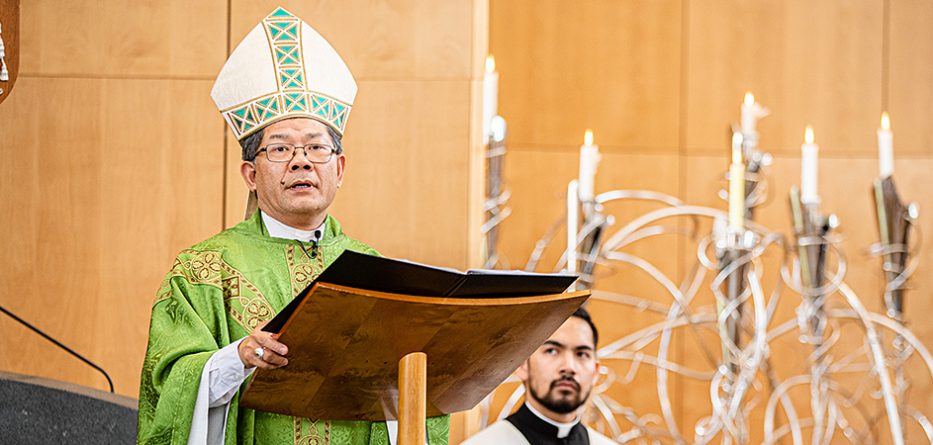Most Reverend Vincent Long Van Nguyen OFM Conv DD STL, Bishop of Parramatta
Homily for the 23rd Sunday in Ordinary Time Year A 2020 at St Patrick’s Cathedral, Parramatta, 6 September 2020
Readings: Ez 33:7-9; Romans 13:8-10; Matthew 18:15-20
6 September 2020
Healing conflict and building communion
Dear friends,
We are living in an increasingly polarised world. During the Cold War era, this polarisation was clearly visible and sometimes with dramatic symbols such as the Berlin Wall in Germany, the bridge along the 17th parallel in Vietnam, and the ironically named “Demilitarised Zone” in Korea. These days, the division is not between the two opposing superpowers and their respective alliances. Rather, it is more deeply entrenched within the borders of every society. Even in countries with established democratic systems, the political discourse has become more divisive and even toxic. It is a worrying trend when everything is seen through the prism of enemy versus friend distinction. In this way, there is little room for dialogue, understanding, and cooperation for the common good, but only mutual hatred and exclusion.
The Word of God this Sunday provides a way forward in dealing with conflicts and differences. It exhorts us to heal division, restore unity, and build a community of mutual understanding, care, and solidarity. It does not take away the hard work of truth-telling and correction. But ultimately, it teaches us that Christian discipleship is to follow the example of the one who heals, restores, and accompanies others on the road of wholesome transformation.
In the first reading, Ezekiel was called to be a sentry to the House of Israel and to be God’s mouthpiece. He was to watch for danger and sound a warning when it appeared. Ezekiel lived during one of the most tumultuous times in Israel before the exile. The Jewish monarchy had declined and the nation had fractured. The ruling elite had no concern for the poor but instead manipulated the political chaos to their advantage. It was in this abysmal situation that Ezekiel was commissioned to speak God’s Word. He was not afraid to challenge the power that be. His message of conversion to truth, justice, and integrity of life was as unpopular then as it is unpopular now.
Ezekiel’s message does not challenge only the rulers, kings, and high priests at great personal cost. He also calls us all to look at ourselves and discover those uncomfortable truths that we hide behind our appearances. Like a sentinel, Ezekiel sounds a warning; he blows a whistle to awake our consciences. He questions the status quo; he challenges the system; he calls us individually to remove the obstacles and barriers that stand in the way of God’s plan for humanity.
Matthew picks up from Ezekiel’s theme and enlarges it so that the responsibility of calling to repentance falls on more than one person, eventually on the community. In Jesus’ time, people lived in small and closely knitted communities and not in megacities like we do today. Thus, the idea of fraternal or communal correction was quite familiar to them. In the early Christian community, it would have been crucial to resolve internal disputes and ensure the harmony of a common life for all. Today’s Gospel addresses difficult circumstances that confront the life of a community. When a brother or a sister strays, it is the duty of the whole community to restore him/her. In effect, we are called to be our brothers’/sisters’ keepers. In our increasingly litigious society, Jesus provides us with the alternative Christian model of fraternal correction, care, and accompaniment.
Dear brothers and sisters,
It is not easy for us to be the healers and restorers of what is broken and damaged in our interpersonal relationships or in the public sphere. Yet, that is our calling even as we were baptised and anointed like Christ as priest, prophet, and king. We need to see, judge, and act in a way that brings the Gospel to life. In particular, we need to be the voice for the voiceless, the force for justice and equity, the defence for the defenceless and vulnerable.
St Paul reminds us that we should avoid getting into debt, except the debt of mutual love. We owe that debt especially to the poor, the needy, and the suffering around us and beyond.
Jesus, like Ezekiel, was not one who shirked from the existential risk of being the teller of truth. Indeed, suffering was the constant feature of His life. It was interwoven into every word he spoke and every action he performed. Suffering was inseparable from his teachings, parables, and everything that he stood for. If we are His true disciples, we must not shirk either from the inherent risk of discipleship. May we grow each day in the paschal rhythm and become the wounded healer in the example of the Suffering Messiah.








